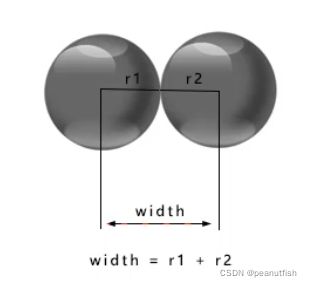浅谈pygame.sprite的精灵碰撞
浅谈pygame.sprite的精灵碰撞
pygame中的精灵碰撞是可见游戏中用的最基础的东西,这里结合官方文档和小甲鱼的网站上的内容做个小总结,方便日后使用。
pygame.sprite.Sprite - 可见游戏对象的简单基类。
Sprite(*groups) -> Sprite
-
pygame.sprite.Sprite.update - 控制精灵行为的方法
-
pygame.sprite.Sprite.add - 将精灵添加到组中
-
pygame.sprite.Sprite.remove - 从组中删除精灵
-
pygame.sprite.Sprite.kill - 从所有组中删除Sprite
-
pygame.sprite.Sprite.alive - 精灵属于任何组的检测
-
pygame.sprite.Sprite.groups - 包含此Sprite的组列表
pygame.sprite.Group - 用于保存和管理多个 Sprite 对象的容器类。
Group(*sprites) -> Group
- pygame.sprite.Group.sprites - 此组包含的 Sprite 列表
- pygame.sprite.Group.copy - 复制组
- pygame.sprite.Group.add - 将 Sprite 添加到此组
- pygame.sprite.Group.remove - 从组中删除 Sprite
- pygame.sprite.Group.has - 测试一个 Group 是否包含 Sprite
- pygame.sprite.Group.update - 在包含的 Sprite 上调用 update 方法
- pygame.sprite.Group.draw - blit Sprite 的图像
- pygame.sprite.Group.clear - 在 Sprites 上绘制背景
- pygame.sprite.Group.empty - 删除所有 Sprite`
上面两个基类是pygame中最常用,相当轻量级,只为大多数游戏常见的代码提供了一个起始点。
Sprite 类旨在用作游戏中不同类型对象的基类,为我们碰撞检测做准备。还有一个基本的 Group 类,它只存储 sprite 对象, 这样方便不同类型的精灵进行碰撞检测, 通常的操作 in / len / bool / iter 都对这个group使用。
in test if a Sprite is contained
len the number of Sprites contained
bool test if any Sprites are contained
iter iterate through all the Sprites
pygame.sprite.spritecollide() - 在与另一个精灵相交的组中查找精灵
spritecollide(sprite, group, dokill, collided = None) -> Sprite_list
-
返回一个sprite列表,其中包含与另一个 Sprite 相交的 Group 中的所有 Sprite 。 通过比较每个 Sprite 的 Sprite.rect 属性来确定交集。
-
dokill 参数是一个布尔值。如果设置为 True,则将从组中删除所有碰撞的 Sprite 。
-
collided 碰撞参数是一个回调函数,用于计算两个精灵是否发生碰撞。 它应该将两个精灵作为值,并返回一个 bool 值,指示它们是否发生碰撞。 如果未传递碰撞,则所有精灵必须具有 rect 值,该值是 sprite 区域的矩形,将用于计算碰撞。
可用的回调函数
collide_rect, collide_rect_ratio, collide_circle, collide_circle_ratio, collide_mask-
pygame.sprite.collide_rect - 使用 rects 检测两个精灵之间的碰撞。
-
Collision detection between two sprites, using rects. 使用函数pygame rect colliderect检测碰撞并将结果返回给*collide, 精灵必须具有 ‘rect’ 属性。
collide_rect(left, right) -> bool
-
-
pygame.sprite.collide_rect_ratio - 使用按比例缩放的 rects 检测两个精灵之间的碰撞。
-
Collision detection between two sprites, using rects scaled to a ratio. 使用 ratio 创建,然后将实例作为碰撞回调函数传递给 *collide 函数。
ratio 是浮点数 - 1.0 是相同的大小,2.0 是两倍大,0.5 是大小的一半。
collide_rect_ratio(ratio) -> collided_callable
-
-
pygame.sprite.collide_circle - 使用圆圈检测两个精灵之间的碰撞。
-
pygame.sprite.collide_circle_ratio - 使用按比例缩放的圆圈检测两个精灵之间的碰撞。
-
Collision detection between two sprites, using circles scaled to a ratio. 使用浮点数 ratio 创建,然后将实例作为碰撞回调函数传递给 *collide 函数。ratio 是浮点数 - 1.0 是相同的大小,2.0 是两倍大,0.5 是大小的一半。
两个精灵之间的碰撞创建的可调用测试,通过测试以查看以精灵为中心的两个圆是否重叠,在通过存储的比例缩放圆半径之后。如果精灵具有 radius 半径属性,用于创建圆,否则会创建一个足够大的圆,以完全包围由 rect 属性给出的精灵矩形。打算作为碰撞回调函数传递给 *collide 函数。
精灵必须具有 rect 和可选的 radius 属性。
collide_circle_ratio(ratio) -> collided_callable
-
-
pygame.sprite.collide_mask - 使用蒙版在两个精灵之间进行碰撞检测。
-
*Collision detection between two sprites, using masks. *返回 masks 碰撞的 mask 上的第一个点,如果没有碰撞,则返回 None 。
通过测试它们的 bitmasks(
pygame.mask.Mask.overlap()) 是否重叠来测试两个精灵之间的碰撞。 如果精灵具有 mask 属性,该属性用作 mask,否则将从精灵图像创建 mask 。 作为碰撞回调函数传递给 *collide 函数。精灵必须具有 rect 和可选的 mask 属性。
如果要多次检查碰撞,应该考虑在加载时为精灵创建一个mask。这将提高性能,否则这可能是一个昂贵的功能,因为它会在每次检查碰撞时创建 mask 。
# Example of mask creation for a sprite. sprite.mask = pygame.mask.from_surface(sprite.image)collide_mask(sprite1, sprite2) -> (int, int)
collide_mask(sprite1, sprite2) -> None
-
-
pygame.sprite.groupcollide - 查找在两个组之间发生碰撞的所有精灵。
-
Find all sprites that collide between two groups.
-
This will find collisions between all the Sprites in two groups. Collision is determined by comparing the
Sprite.rectattribute of each Sprite or by using the collided function if it is not None.Every Sprite inside group1 is added to the return dictionary. The value for each item is the list of Sprites in group2 that intersect. 像这个格式{group1_sprite: group2_sprite}
-
如果*collide没有指定回调函数,则所有的sprite需要有rect属性
groupcollide(group1, group2, dokill1, dokill2, collided = None) -> Sprite_dict
EG: class Block(pygame.sprite.Sprite): # Constructor. Pass in the color of the block, # and its x and y position def __init__(self, color, width, height): # Call the parent class (Sprite) constructor pygame.sprite.Sprite.__init__(self) # Create an image of the block, and fill it with a color. # This could also be an image loaded from the disk. self.image = pygame.Surface([width, height]) self.image.fill(color) # Fetch the rectangle object that has the dimensions of the image # Update the position of this object by setting the values of rect.x and rect.y # give radius and mask attribute self.rect = self.image.get_rect() self.radius = self.rect.width / 2 self.mask = pygame.image.from_surface(self.image) class File(pygame.sprite.Sprite): # Constructor. Pass in the color of the block, # and its x and y position def __init__(self, color, width, height): # Call the parent class (Sprite) constructor pygame.sprite.Sprite.__init__(self) # Create an image of the block, and fill it with a color. # This could also be an image loaded from the disk. self.image = pygame.Surface([width, height]) self.image.fill(color) # Fetch the rectangle object that has the dimensions of the image # Update the position of this object by setting the values of rect.x and rect.y self.rect = self.image.get_rect() self.radius = self.rect.width / 2 self.mask = pygame.image.from_surface(self.image) block_group = pygame.sprite.Group() for i in range(5): block = Block(color, width, height) block_group.add(block) # there is another sprite group called file_group, which have same setting as block_group. file_group = pygame.sprite.Group() for i in range(5): file = File(color, width, height) file_group.add(file) # the collide check will like: hit_list1 = pygame.sprite.spritecollide(block, file_group, False, pygame.sprite.collide_rect hit_list2 = pygame.sprite.spritecollide(block, file_group, False, pygame.sprite.collide_rect_ratio(.75)) hit_list3 = pygame.sprite.spritecollide(block, file_group, False, pygame.sprite.collide_circle hit_list4 = pygame.sprite.spritecollide(block, file_group, False, pygame.sprite.collide_circle_ratio(.25)) hit_list5 = pygame.sprite.spritecollide(block, file_group, False, pygame.sprite.collide_mask # select the collided function whatever you like hit_list6 = pygame.sprite.spritecollide(block_group, file_group, False, False, pygame.sprite.collide_XXX) -
-
